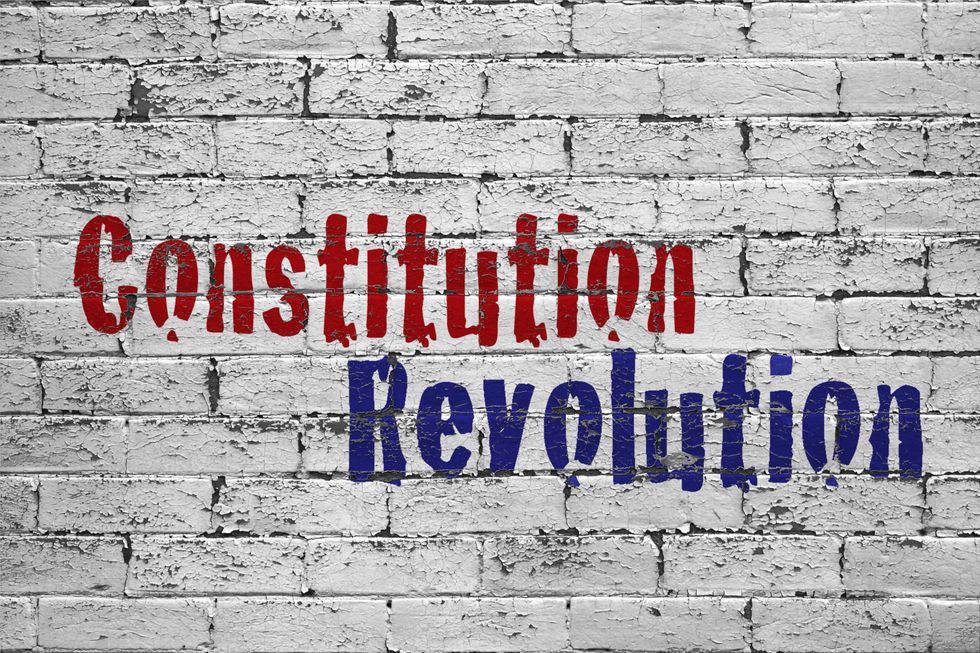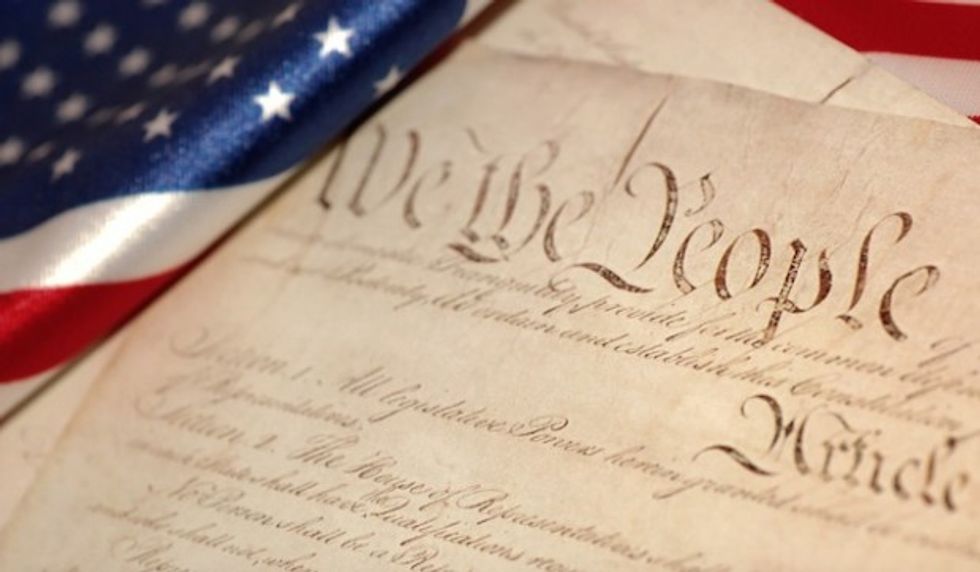
Photo Courtesy of Author.

This post is the continuation of a weekly Constitution Revolution series for TheBlaze.com and TheBlaze Radio’s Chris Salcedo Show. To see last week’s lesson, click here.
–
In some ways, it’s sad that we have to stop here and take time to discuss the Necessary and Proper Clause. It is such a simple, straightforward part of the Constitution. All you need to figure out the meaning of this clause is a dictionary and little bit of common sense.
But as you know, those who wish our federal government had been granted more power than it was have no problem at all with distorting the clear language of the Constitution in order to get what they want. And ever since our Constitution was ratified they’ve been doing exactly that.

In order to clear all that up, we do need to take some time to explain why the Necessary and Proper Clause means exactly what it says. Let’s start by going to the end of Article 1, Section 8 and looking at the text. It says that Congress has the power:
“To make all Laws which shall be necessary and proper for carrying into Execution the foregoing Powers, and all other Powers vested by this Constitution in the Government of the United States.”
Necessary means “required” or “essential to.” So common sense would tell us that this clause just gives Congress the authority to pass the laws that are required for it to execute the powers that are granted to it in other areas of the Constitution. That’s all there is to it.
In a lot of ways the Necessary and Proper Clause is like your appendix - you could remove it completely from the Constitution and it wouldn't really change anything. The main difference between this clause and your appendix is that the Necessary and Proper Clause does have one extremely minor function: It clarifies that the Framers did intend to give Congress the authority to pass those laws that are a necessary part of executing the powers that are granted to it in the Constitution.
Of course, those who want our federal government to have much more power than it was actually granted don’t like that fact.
And that’s where Alexander Hamilton comes in.
 Jeannine Strampel walks through the snow past a statue of Alexander Hamilton along Commonwealth Avenue Mall on February 8, 2013 in Boston, Massachusetts. Credit: Getty Images
Jeannine Strampel walks through the snow past a statue of Alexander Hamilton along Commonwealth Avenue Mall on February 8, 2013 in Boston, Massachusetts. Credit: Getty Images
All the way back in 1791, Hamilton got the party started on claiming that this clause actually gives the people in our government a green light to interpret the powers granted in the Constitution very broadly - and in ways that give the federal government a lot more power.
In his argument in favor of establishing a national bank, Hamilton argued that:
“[I]t will not be contended… that the clause in question gives any new or independent power. But it gives an explicit sanction to the doctrine of implied powers.”
In other words, Hamilton is claiming that this clause means that we should interpret the terms in the Constitution very broadly. According to Hamilton, “necessary” didn’t really mean “necessary.” Instead, it meant Congress could take actions that were “incidental to” or “convenient for” executing the powers granted to them in the Constitution.
There are only two slight problems with that:
In the Pennsylvania Ratifying Convention, James Wilson expressed the widely accepted view of the Necessary and Proper Clause prior to the Constitution being ratified when he said that it:
“gives no more or other powers nor does it, in any degree, go beyond the particular enumeration; for, when it is said that Congress shall have power to make all laws which shall be necessary and proper, those words are limited and defined by the following, ‘for carrying into execution the foregoing power.’ It is saying no more than that the powers we have already particularly given, shall be effectually carried into execution.”
In other words, he’s saying that when they used the terms “necessary and proper,” that’s exactly what they meant. There was no big push at the time to give this clause the expanded meaning that Alexander Hamilton claimed when he argued for a National Bank. If the American people had believed that Hamilton’s interpretation would prevail the Constitution never would have been ratified.
In his book “Federalism: The Founders’ Design,” Raoul Berger does a great job of laying out some of the lengths that the Founders went to to avoid giving the federal government an excuse to resort to implied powers.
As one example, Berger points to a change that was made to the part of Article 1, Section 8 that gives Congress the power “to raise and support armies:”
“The Framers did not trust implied powers, as is exemplified by [Nathaniel] Gorham’s successful motion to add “and support” to the “to raise armies” phrase, although a power to raise armies reasonably might have been construed to include the power to support them.”
It’s just not realistic to believe that the same group of people who weren’t comfortable allowing the federal government to imply that a power to raise armies also included a power to support them actually intended to give the federal government “explicit sanction to the doctrine of implied powers.”
When the Framers wrote “necessary and proper” they meant exactly that. This clause simply clarifies that Congress has the authority to pass laws that common sense would tell us are necessary to execute the powers that are granted in the Constitution.
As James Madison explained it to the Virginia Ratifying Convention, the Necessary and Proper Clause:
“gives no supplementary power. It only enables them to execute the delegated powers… It is at most but explanatory. For when any power is given, its delegation necessarily involves authority to make laws to execute it.”
If that makes it seem like the Necessary and Proper Clause doesn’t do much of anything, that’s because it really doesn’t. It’s just there for clarification and nothing more.
Chad Kent is an author and speaker with a unique style that makes the Constitution simple and fun. Listen to Chad every Saturday during The Chris Salcedo Show on TheBlaze Radio, visit his web site at www.ChadKentSpeaks.com, and like his Facebook page at www.facebook.com/theconstitutionguy.
Feature Image: Courtesy of Author
–
TheBlaze contributor channel supports an open discourse on a range of views. The opinions expressed in this channel are solely those of each individual author.